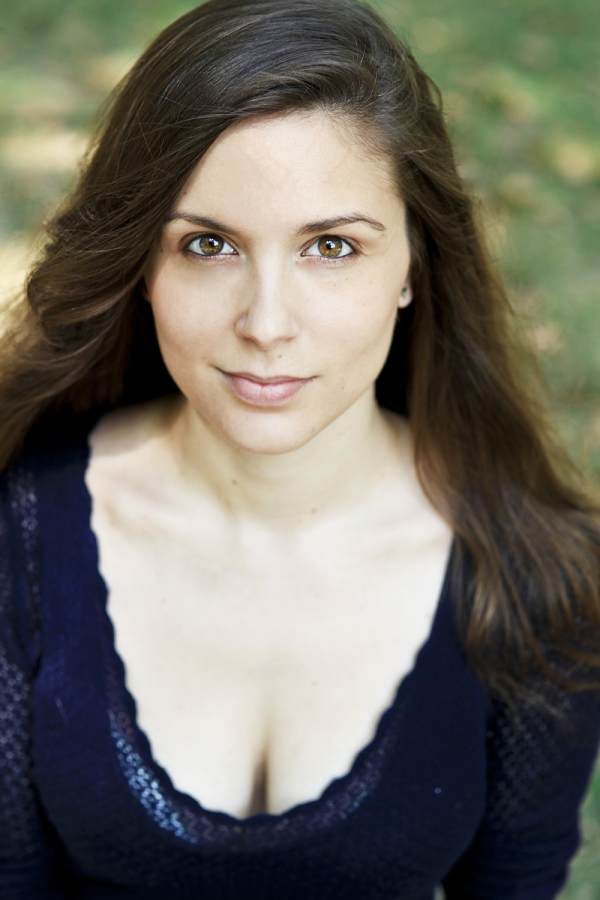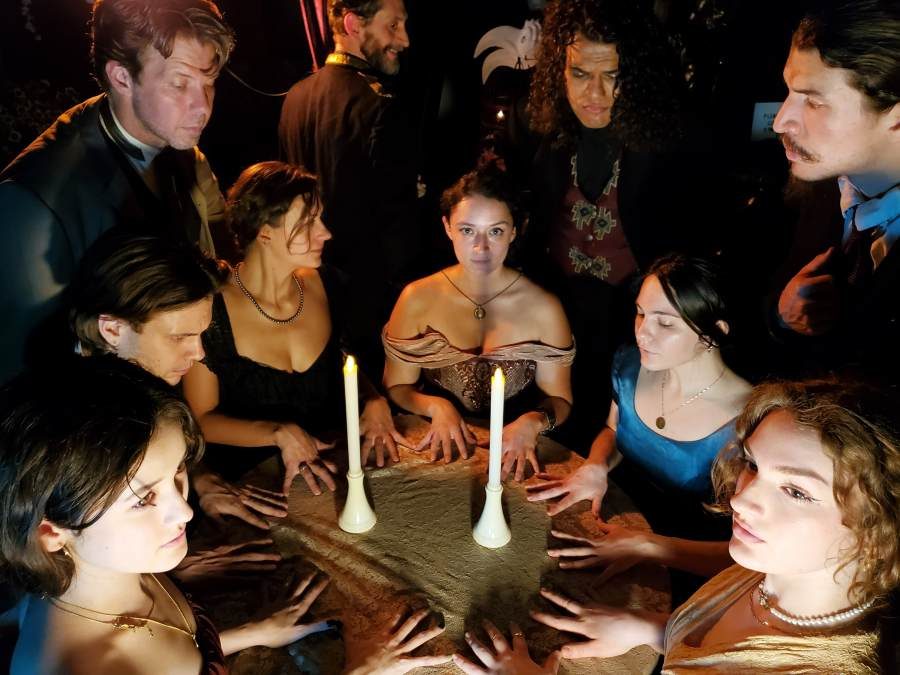

Playwright, director, and actor Sara Fellini's work has been described by the New York Times as "darkly humorous, deliciously ghoulish." spit&vigor, of which Fellini is the artistic director, has produced gothic-style pieces like The Wake of Dorcas Kelly (about a brothel madam serial killer), The Execution of Mrs. Cotton (about a postbellum Southern serial killer), and In Vestments (an immersive ghost story in a church). Now, she's getting ready to present another on-brand production: Ectoplasm, a play about a tense séance at a 1912 dinner party. We spoke with Fellini about the writing/directing/acting connection, feminist serial killers, and her obsession with the morbid.
You seem drawn to macabre material, especially in your two latest productions: The Wake of Dorcas Kelly and now Ectoplasm. Why do you think that is?
There was a lot of death in my hometown growing up. A lot of children and teenagers died very gruesome and horrible deaths, so death was ever-present. One of the priests in my parish commented that he’d never seen so much untimely death in all the towns he’d worked in. And my mother died when I was thirteen, followed shortly by my very, very beloved grandmother. I sometimes find myself comforted by the smell of lilies and carnations, even though (or because) they remind me of funeral homes.
I think that’s why I’m interested in the macabre, but I also think that interest in the macabre is normal and healthy and it’s not right to hide death away and pretend it doesn’t exist. It’s supremely creepy to embalm people, to pretend that their vessel is not decaying, and prop them up like they’re just sleeping.
I’m also interested in the very sudden end of communication between yourself and the dead person, and the desperation living people can have to reconnect to a dead person. It’s something you don’t really prepare for even when you know someone is sick - suddenly not being able to tell them something or hear their opinion. I remember after my mother died, I had a very casual thought on the way back from her funeral that I should tell her that her favorite priest performed the mass. And then I was struck, suddenly, by her absence, and the fact that I would never be able to tell her anything, ever again.
The Wake of Dorcas Kelly was pretty comical, though in a dark way. How do you walk that delicate balance between upsetting and funny?
Maybe it comes from the Irish side of my family, but I can’t help but see comedy everywhere when it comes to death. Comedy comes from uncomfortable juxtapositions, and there is nothing more uncomfortably juxtaposed than trying to make death, a completely undignified affair where your closest relatives are dressing you, and your eyes are freaky, and we have to sew your mouth shut and your body is full of terrible gasses and completely limp and stupid, and your idiot daughter is trying to fit you into a lavender suit you haven’t worn since 1975 because she’s chosen to be very sentimental about lavender being your favorite color and she’s on the verge of totally losing it so nobody says anything about it and if you were alive you’d be SCREAMING with embarrassment, but we’re all pretending it’s very solemn. I mean, isn’t that funny?
You often write and direct your plays. Do you think that helps preserve your vision?
Yes, and that’s the only reason I do it. I personally only know one director who could preserve my vision like I do, but sadly theater was too dramatic for her, understandably, and she doesn’t direct anymore. I didn’t go to school, so I don’t have a huge community to draw from, but I’m still hoping to meet someone else to direct my plays.
Is that ever a retroactive process? For example, do you ever realize while directing that you need to make a change to the script?
I have to resist that instinct. I know that I could write, rewrite, and correct until we are all dead and buried, so I have to, have to, have to treat the script as if someone else wrote it and I have no power to change it.
You’re also an actor. Has that had any effect on your writing and directing?
It’s harder to memorize lines because I have every past edit of every line in my head. Otherwise, it impacts my directing because some actors (not ones we tend to work with, but sometimes you can run into this issue when you try to expand a bit) can get very defensive when a woman is in charge of many aspects of the production and they put their backs up. We don’t grant women the eclectic genius of an Orson Welles or Sam Shephard or William Shakespeare or Quentin Tarantino or the guy who did Twin Peaks. So, I have to do my best to work through that, but sometimes it’s extremely difficult. I have to just forget I’m a woman.

A lot of your work has a feminist nature, but you’re also dealing with real historical women who were very complex characters. Why do you think it’s important to present that darker, more complicated side of feminism? Is it ever a challenge?
It’s not a challenge to write it or direct it, because I just write people without putting a lens on them, and I’m good at communicating the essence of a character, but it’s a challenge to witness the reception of it. People will bend over backwards to feed their inherent misogyny without even realizing it. It’s subtle and very annoying.
An example. I once wrote a play about a woman serial killer, and in writing it, I was very cognizant of this very interesting and nuanced fact that I came upon in my research, noted by historian David Wilson: in general, male serial killers are interpreted by society to enjoy killing, to get a sick thrill out of it, because we as a society generally grant men an internal life with desires and motivations beyond the practical. Female killers are generally interpreted to kill for financial or strategic motivations, because we generally expect women to be untrustworthy little thieves, to paraphrase. It’s an interesting tidbit, one that isn’t really that useful in real life except if you’re interested in feminism for serial killers.
A paper of note came to the production of my play and mentioned in their review that my main character had several speeches about how she enjoyed killing. Then the paper went on to bemoan that there was no information in the play about exactly why the killer killed. It’s frustrating to specifically try to combat a small bit of sexism and then have it thrown back in your face.
Where did the idea for Ectoplasm come from?
I’ve been interested in writing a play about mediums since I read Mary Roach’s Spook, about the scientific approach to finding the soul. It is more scientific than you think!! There are real scientists who are very solemnly studying the concept. In the book, there is an incredible passage about spiritual mediums, and how scientists of the time would attempt to disprove them, and I find that a very amusing image - all these very serious men trying to disprove ghosts by harassing a bunch of women who are just trying to make a dollar (on the backs of the grieving, it must be said). There’s a wonderful bit about William Crookes, a particularly susceptible soul, and how he was taken in again and again by obvious frauds, that I found very funny and I added a bit of his life to the play.
What part of Ectoplasm are you most excited to share with audiences?
The cast is incredible. They are passionate, and do everything to understand the material and add their own insights and experiences. They’re the people that make theater exciting and you just have to see them at work. I hope everyone who comes to the show either really, really enjoys Ectoplasm, or really, really hates it.
'Ectoplasm,' written and directed by Sara Fellini, runs January 13 through February 6 at the Players Theatre (115 MacDougal St) in the West Village. For more info and to purchase tickets, see the link below: